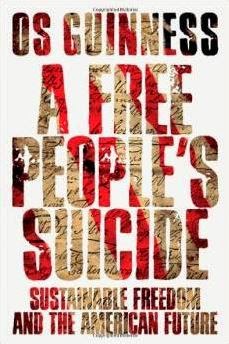For Noah Webster ["Schoolmaster of the Republic"], and other beneficiaries of the Reformation that grew out of northern Europe, liberty was built upon a foundation of self-government under God. This remarkable and revolutionary concept of freedom provided hope that a Constitutional Republic might work. At least it provided hope for those sharing Webster's convictions. Christianity was the quintessential silent partner: it provided the needed moral capital, yet did not force control.
Here's the catch: No state can mandate self-government
under God, yet only people who practice self-government under God can build and
maintain a truly free society. Democracy in and of itself is no brass ring. Hitler came to power through democracy. If 50.1% of voting Americans reject Truth, our system will produce outcomes as bad as any
godless despot. If government by one Truth-rejecter is ruinous, imagine what government by millions will
do. We're watching it now.
Daniel Webster, Secretary of State under three presidents, summed it up this way: “Our ancestors established their system of government on morality and religious sentiment. Moral habits, they believed, cannot safely be trusted on any other foundation than religious principle, nor any government be secure which is not supported by moral habits. Living under the heavenly light of revelation, they hoped to find all the social dispositions, all the duties which men owe to each other and to society, enforced and performed. Whatever makes men good Christians makes them good citizens.”
Both Websters
would be castigated by Christophobics today.
Another high office-bearer declared: "America became the common meeting-place of all those streams of people, great and small, who were undertaking to deliver themselves from all kinds of despotism and servitude, and to establish institutions of self-government and freedom...It was the principle of personal judgment in matters of religion for which the English and Dutch were contending, and which set the common people to reading the Bible. There came to them a new vision of the importance of the individual which brought him into direct contact with the Creator. It was this conception applied to affairs of government that made the people sovereign…The logical result of this was the free man, educated in a free school, exercising a free conscience, maintaining a free government. The basis of it all, historically and logically, is religious belief.
These are the fundamental principles on which American institutions rest…”
Another high office-bearer declared: "America became the common meeting-place of all those streams of people, great and small, who were undertaking to deliver themselves from all kinds of despotism and servitude, and to establish institutions of self-government and freedom...It was the principle of personal judgment in matters of religion for which the English and Dutch were contending, and which set the common people to reading the Bible. There came to them a new vision of the importance of the individual which brought him into direct contact with the Creator. It was this conception applied to affairs of government that made the people sovereign…The logical result of this was the free man, educated in a free school, exercising a free conscience, maintaining a free government. The basis of it all, historically and logically, is religious belief.
These are the fundamental principles on which American institutions rest…”
 |
| Were the views of Americans quoted above mere opinions of eccentric and marginal voices? Not according to French historian Alexis De Tocqueville. In Democracy in America (1835/40), De Tocqueville observed: "...in America, religion is the road to knowledge, and the observance of the divine laws leads man to civil freedom." In our present day, Anglo-Irish cultural critic Os Guinness concludes: "Americans today are heedlessly pursuing a vision of freedom that is short-lived and suicidal. Once again, freedom without virtue, leadership without character, business without trust, law without customs, education without meaning and medicine, science and technology without human considerations can end only in disaster." In A Free People's Suicide, Guinness declares: "...the ultimate threat to the American republic will be Americans. The problem is not wolves at the door but termites in the floor." |





